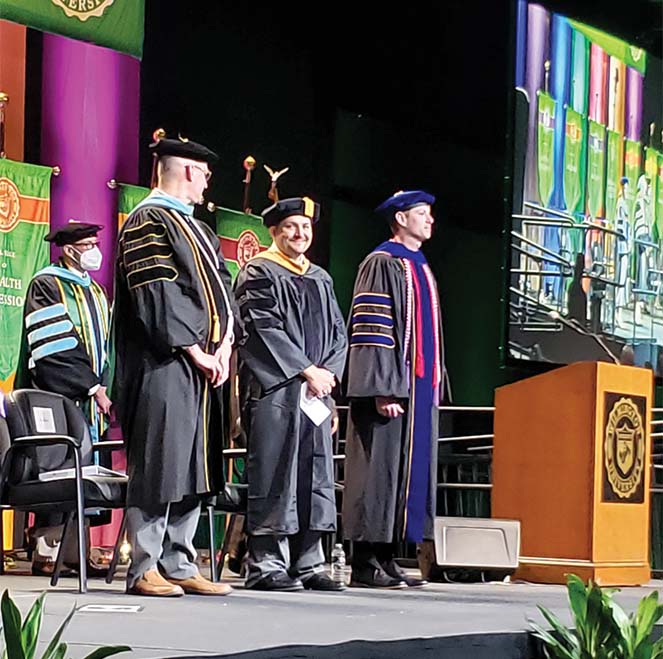Dr. Robert Gregor: Serving His Home Community

Luzerne County, Pennsylvania, is populated by hard people, made so by hard times.
Coal mining spurred an economic boom in the county and its major city, Wilkes-Barre, from the 1860s through the first half of the 20th century. Hundreds of thousands of immigrants arrived, eager to earn a decent wage by toiling underground, prying anthracite from the earth’s grasp.
The city’s population peaked in 1930, at about 86,000. But following World War II, the area’s mining industry collapsed, and today Wilkes-Barre is home to only about 44,000 people. Per capita income is $20,785, compared to a national average of $35,384. Family median income is $40,505, while the national figure is $64,994. Twenty-three percent of the population lives below the poverty line.
Wilmington University alumnus Dr. Robert Gregor is Luzerne County right down to the bone. Born and raised there, he has spent more than two decades working in health care in the Wilkes-Barre area, giving him first-hand knowledge of the maladies his sometimes economically challenged patients suffered. He put that knowledge to good use when he enrolled at WilmU in 2019 to pursue a Doctor of Nursing Practice degree.
Early on, Dr. Gregor had decided he wanted to go into health care. “From a very young age,” he says, “I wanted to try to help sick people.”
He became even more focused on that career after developing ulcerative colitis as a teenager and being treated successfully by a gastroenterologist. The experience demonstrated to him the healing power of proper medical care.
From a very young age,, I wanted to try to help sick people.”
— Dr. Robert Gregor
But first, he needed a quality education. And football seemed as if it might be a ticket to that education. The strapping young man grew into a 6-2, 250-pound guard on the James M. Coughlin High School football team, and college scouts soon came calling.
In his senior year, Cornell University recruited him. Offered an academic scholarship and student aid package, Dr. Gregor jumped at the chance to get an Ivy League education. He spent four years in the classroom and on the gridiron for the Big Red, graduating in May of 1997 with a degree in Nutritional Science.
After Cornell, he returned home and completed basic nursing training at Luzerne County Community College in Nanticoke. Then it was on to another Luzerne County school, Misericordia University, for his master’s in nursing and certification as a Family Nurse Practitioner.
For the next 15 years, Dr. Gregor worked as a family nurse practitioner and also served as a student clinical preceptor in the Berwick area. During this time, he discovered low vitamin D levels among an alarming number of his elderly patients, especially during the winter.
“Your body makes vitamin D when exposed to adequate sunlight,” he says. Indulging in the exaggeration allowed of a native son, he adds: “And up here, sometimes you don’t see the sun for three months.”
Vitamin D deficiency is associated with myriad preventable chronic illnesses, increased fracture risk, low calcium absorption, decreased bone density, and diminished muscle health.
The knowledge he gained from working with his patients became the focal point of his thesis at WilmU. “I wanted to tie in not only my nursing background, but also my degree in Nutritional Science in the doctoral project,” says Dr. Gregor. “WilmU provided me the opportunity to do that.”
He cites three reasons for choosing Wilmington: “The reputation of the program, coupled with the reputation of the director of the program, Dr. Aaron Sebach, and the ability to do the courses remotely.”
[Bob] was brilliant and dedicated to his studies, and was always looking to go above and beyond. He always wanted to make his work product exceptional.”
— Dr. Aaron Sebach
Dr. Sebach was not only Dr. Gregor’s teacher; he also served as his doctoral project advisor. The evidence-based practice project focused on vitamin D screening and supplementation in an at-risk elderly family practice population, a program Dr. Gregor successfully implemented among his patients over a three-month period in 2021.
Dr. Gregor and Dr. Sebach co-authored an article based on the project that was published in the February 2022 issue of the Journal for Nurse Practitioners.
“Bob was one of those students who makes a lasting impact,” Dr. Sebach says. “He was brilliant and dedicated to his studies, and was always looking to go above and beyond. He always wanted to make his work product exceptional. He wanted it to be something that he would be proud of, his colleagues would be proud of, his patients would be proud of, and the University would be proud of.”
Dr. Gregor started a new job last fall: Impact Clinic director at the VA Hospital in Wilkes-Barre. There, he clears veterans preoperatively for surgery, ensuring that risk is minimized. “It’s all about having the foresight to avoid poor outcomes,” he says.
His wife, Melissa, is a medical-surgical nurse at Wilkes-Barre General Hospital. They have two boys — Robert, 15, and Ryan, 7. Dr. Gregor helps to coach Robert, a 5-11, 225-pound lineman on the Lake-Lehman High School football team. This is his first year as an assistant coach, but, he says, “I love it. I’ll probably continue to do it until Ryan graduates.”
Noting that earning his doctorate was “rigorous and time-intensive,” Dr. Gregor is a proud alumnus of Wilmington University. “The people that I have met at WilmU have been top-notch academics who have excellent reputations. And I feel as alums, we should help to build the school’s overall reputation. It’s up to us to represent the university to the world, and that’s something I’m happy and proud to do.”



